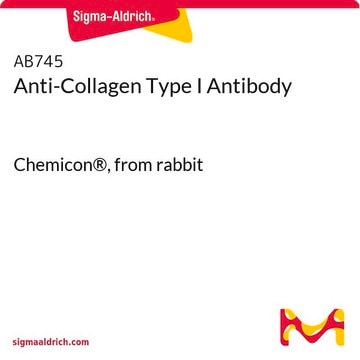MAB1334
Anti-Collagen Types I, II & III Antibody, clone MMCHABC
clone MMCHABC, Chemicon®, from mouse
Synonym(s):
Interstitial Collagens
About This Item
Recommended Products
biological source
mouse
Quality Level
antibody form
purified antibody
antibody product type
primary antibodies
clone
MMCHABC, monoclonal
species reactivity
human
manufacturer/tradename
Chemicon®
technique(s)
ELISA: suitable
immunohistochemistry: suitable
radioimmunoassay: suitable
isotype
IgM
suitability
not suitable for Western blot
NCBI accession no.
shipped in
dry ice
target post-translational modification
unmodified
Gene Information
human ... COL1A1(1277)
Specificity
Immunogen
Application
Immunohistochemistry: cryostat sections fixed with acetone or ethanol. Staining pattern similar to polyclonal antibody to interstitial collagens. Formaldehyde fixation is not recommended.
Not suitable for use on paraffin embedded sections or immunoblots.
Optimal working dilution must be determined by the end user.
Cell Structure
ECM Proteins
Physical form
Storage and Stability
Legal Information
Disclaimer
Not finding the right product?
Try our Product Selector Tool.
Signal Word
Danger
Hazard Statements
Precautionary Statements
Hazard Classifications
Eye Irrit. 2 - Repr. 1B - Skin Irrit. 2
Storage Class Code
6.1C - Combustible acute toxic Cat.3 / toxic compounds or compounds which causing chronic effects
WGK
WGK 2
Certificates of Analysis (COA)
Search for Certificates of Analysis (COA) by entering the products Lot/Batch Number. Lot and Batch Numbers can be found on a product’s label following the words ‘Lot’ or ‘Batch’.
Already Own This Product?
Find documentation for the products that you have recently purchased in the Document Library.
Our team of scientists has experience in all areas of research including Life Science, Material Science, Chemical Synthesis, Chromatography, Analytical and many others.
Contact Technical Service









